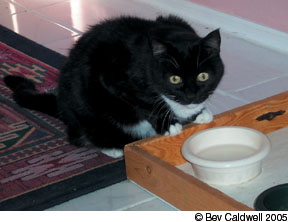Diane Levesque, a jury consultant in Rochester, New Hampshire, was mystified. She had just adopted two domestic shorthaired cats – a brother and sister – from a friend who moved into an apartment where cats were not allowed.

288
Levesque, who already had two cats, was happy that all four felines seemed to get along. Within a couple of days, however, she became alarmed. I noticed the new cats were not eating anything, said Levesque. At first, I thought I must be imagining it because they seemed normal otherwise. But they started looking thinner.
After consulting with a veterinarian, Levesque learned that her new cats were suffering from anorexia due to the trauma of moving to unfamiliar surroundings. She ultimately decided to give the cats back. They were then treated for anorexia by their former owners veterinarian and given to a shelter for adoption.
Most of us know that a reduced appetite or not eating is a sign of physical illness in a cat, signs that require medical attention after two days at the most. But what we may not realize is that cats can stop eating because of stress or emotional problems, such as bereavement over the loss of a companion.
Emotions Can Play a Part
Some cats crave company when they eat. Perhaps your cat likes you to walk her to her food dish and seems to enjoy your petting her or talking to her while she eats. Unfortunately, this type of cat will often not eat as well when her human companion is not around. You may have noticed that if you leave your cat for a night or two, she doesnt eat very much of the food you leave for her. But when you return, she runs for the food dish.
Another classic example is a cat that stops eating when he is hospitalized for an injury or illness. Your cat may be stressed by the cage, different food, bedding, litter and the sight, smell and sounds of dogs and other cats, says Katherine Houpt, VMD, PhD, a board-certified veterinary behaviorist and director of the Behavior Clinic at Cornell Universitys College of Veterinary Medicine.
Cats may also become anorexic if a feline or human companion suddenly dies, leaving the cat to grieve. Not eating can be a manifestation of this grief, just the same as it is in humans.
But due to cat physiology, anorexia in cats can be very dangerous, even life-threatening. This is particularly true with overweight or fat cats, says Dr. Houpt, because they can succumb to fatty liver disease if they stop eating. (See related article in the April, 2005 issue of CatWatch.)
Taking Charge of Anorexia
If you realize that your cat is consistently eating less or not at all, bring your feline friend to a veterinarian right away to rule out physical illness. Dont let him go for more than two days without eating.
If the veterinarian diagnoses a psychogenic reason for the anorexia, there are a number of steps to take. First, sit with your cat and encourage him to eat. Make regular food more palatable by giving your cat wet food or even baby food, says Dr. Houpt. Try sprinkling the food with the water from a can of tuna to give it more taste. Another hint: Slightly warming wet food can make it more aromatic and attractive to your cat.
If your cat is hospitalized for a physical cause and is not eating, visit him in the hospital and encourage him to eat. Cats probably think of us as their parents, says Dr. Houpt, and having us near them can help them feel protected when they are in unfamiliar surroundings.
Other Ways to Help
Another thing that helps a cat that is in unfamiliar territory is a product called FeliwayTM, says Dr. Houpt. This is a synthetic version of a cats cheek secretion that induces familiarity for a cat. You can buy this in a pet supply store as a spray or a plug-in diffuser.
No doubt you know how your cat rubs her face against furniture and your leg or hand when she enters a room. This is how your cat says, You are mine, explains Dr. Houpt. What your cat is actually doing is placing a chemical-released by a gland in her cheek-on an object. The cat then smells or senses the chemical and recognizes the object as part of her territory.
The synthetic spray, when used in a new location, will make your cat feel more comfortable in strange surroundings. This may help her settle down, lower her anxiety level and increase the chances that she will feel more at ease to eat.
If these tricks dont work, there are at least three medications in pill form that your veterinarian can prescribe to help stimulate your cats appetite. Appetite stimulants like these are not always successful, though. In rare circumstances, especially for cats with some underlying disease, feeding through a tube placed by your veterinarian may be necessary for your cat until she is ready to eat on her own.
Cats, like humans, often dont want to eat when they dont feel well – even if it is because of grief or some kind of emotional trauma. But expert advice, good human company and some kind of medical intervention, if necessary, will usually get your cat eating happily again.



